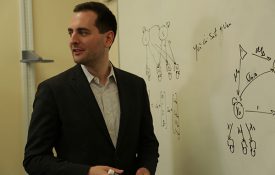-
National Academy of Medicine Elects APS Fellow Ted Abel
APS Fellow Ted Abel of the University of Iowa is among four psychological scientists newly elected to the National Academy of Medicine. Abel is recognized for his work on the interplay of sleep and memory formation and storage, and the molecular basis of neurodevelopmental and psychiatric disorders, including autism. Abel is Professor and Chair of UI’s Department of Neuroscience and Pharmacology and Roy J. and Lucille A. Carver College of Medicine. He is director of the Iowa Neuroscience Institute at the university.
-
Robert Provine, 1943 – 2019
APS Fellow Robert R. Provine, who studied the development and evolutionary basis of laughter, hiccupping, yawning, and other social behaviors, died October 17. Provine was a professor emeritus at the University of Maryland at Baltimore County, where he studied and taught for over 40 years after earning his Ph D in psychology at Washington University in St. Louis in 1971. In his social neuroscience research, Provine explored how behavior builds bonds in pursuit of universal underlying processes not only through work with humans, but through comparative studies of dozens of species ranging from chimpanzees to penguins, insects, and snakes.
-
2020 RAND Summer Institute
27th Annual RAND Summer Institute, July 6-9, 2020, in Santa Monica, CA. The RAND Summer Institute will consist of two conferences addressing critical issues facing our aging population: Mini-Medical School for Social Scientists; and a Workshop on the Demography, Economics, Psychology, and Epidemiology of Aging. Interested researchers can apply for financial support covering travel and accommodations. Application Deadline: March 16, 2020 Visit RAND's website for more information and the application form: https://www.rand.org/well-being/social-and-behavioral-policy/centers/aging/rsi.html.
-

Goswami Receives Yidan Prize for Dyslexia Research
APS Fellow Usha Goswami has been named a recipient of the Yidan Prize for Education in recognition of her world-leading research on the importance of linguistic pattern recognition in reading acquisition.
-
A Neurobehavioral Approach to Addiction: Implications for the Opioid Epidemic and the Psychology of Addiction
Psychological Science in the Public Interest (Volume 20, Number 2) Read the Full Text (PDF, HTML) In recent years, heroin and other opioid fatalities have escalated to crisis proportions, intensifying the need for evidence-based recommendations for educational and policy campaigns to prevent abuse of opioids and other substances. Understanding the neurobiological mechanisms underlying drug-seeking behaviors is vital to creating these prevention campaigns. To fully provide a neurobehavioral view of addiction, it is important to answer two major questions: (a) why do people seek drugs in the first place?
-

Elliot Tucker-Drob Receives Prestigious Honor for Lifespan Development Research
APS Fellow Elliot Tucker-Drob of the University of Texas at Austin has been named a recipient of the Max Planck-Humboldt Medal for his achievements in the fields of personality and developmental psychology.

